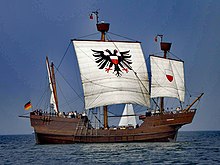Anglo-Hanseatic War
| Anglo-Hanseatic War | |||||||
|---|---|---|---|---|---|---|---|
 Lisa von Lübeck, reconstruction of a 15th-century Hansa caravel |
|||||||
|
|||||||
| Belligerents | |||||||
|
|
|
||||||
| Commanders and leaders | |||||||
| Edward IV of England | Paul Beneke | ||||||
The Anglo-Hanseatic War was a conflict fought between England and the Hanseatic League, led by the cities of Danzig (Gdańsk) and Lübeck, that lasted from 1469 to 1474. Causes of the war include increasing English pressure against the trade of the Hanseatic cities on the southern coast of the Baltic Sea.
In the 15th century, English merchants rivalled with the Hanseatic League to control the wool and cloth trade in England and with the Baltic cities. They urged the English crown to acknowledge their rights to participate in the Baltic trade and in 1447 King Henry VI finally revoked all Hansa privileges. Several Lübeck and Danzig vessels were hijacked by English forces in May 1449. After long and difficult negotiations, an eight-years armistice was agreed in 1456.
However, already in 1458 English privateers again attacked Hansa ships. Peace talks at Hamburg failed in 1465, in particular since England denied any payment of compensation and the Hanseatic cities disagreed about their negotiation line. Tensions increased when in 1468 Danzig privateers, chartered by the Danish Crown, seized several English merchant vessels passing the Sound. King Edward IV of England in turn had the Hanseatic Steelyard trading base in London stormed and plundered the next year. The representatives of the Hanse cities met at Lübeck and decided to go to war. English wool imports were banned and privateers were ordered to raid English sealinks.
The importance of the wool trade from England to the continent by Hanseatic merchants can be seen in the economic outputs, and their subsequent decline in the period noted below during the war, which is denoted as 1471-1475. The economic damage done by the war was one of the main reasons why it came to an abrupt end.
Danzig and, to a lesser extent, Lübeck forces carried the main burden, supported by the cities of Hamburg and Bremen. The city of Cologne opposed the war and was temporarily excluded from the Hansa for this. As the Burgundian duke Charles the Bold cancelled his commitment to open his harbours, the Hanseatic privateers had to wait for departure until spring 1470. The rule of the English king, on the other hand, was weakened by the dynastic Wars of the Roses and in September Edward IV even had to flee to the Burgundian County of Flanders. Duke Charles backed Edward's return to England and now opened his harbours providing the Hansa forces to capture several vessels of the king's enemies. Upon the restoration of the English king, Charles again withdrew his support immediately.
...
Wikipedia
